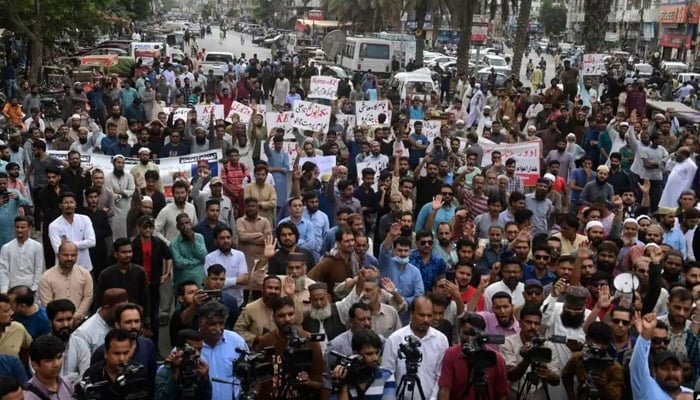Passco employees protest against privatisation of entity
BUREWALA: Employees of the Pakistan Agricultural Storage and Services Corporation (Passco) on Friday launched a strong protest against the government’s proposed plan to privatise the institution.
The protest was led by Passco Vehari Zone In-Charge Akhtar Sohaib and other employees, who wore black armbands and took part in a sit-in at the Passco office. The workers raised their voices in opposition to what they termed the ill-conceived government policies that they believed were aimed at undermining the institution’s success.
The protesting employees spoke against the government’s plan to privatise an institution that, despite operating as a self-sustained and profitable entity, was now being targeted for privatisation under the guise of the International Monetary Fund (IMF) recommendations. According to the workers, the Passco was Pakistan’s 10th most profitable institution and did not rely on any government subsidies or impose any financial burden on the state.
Expressing their frustration, the workers emphasised that the government’s attempt to privatise such a successful institution, while ignoring its critical role in the country’s food security, was a blatant example of poor governance. The protesters argued that privatising Passco would pave the way for private companies and mafias to control the national food reserves, which could create significant food security challenges in the future. They also warned that the government’s actions would result in the loss of jobs and benefits for the employees and further exacerbate the issues faced by the farmers and the general public.
The protesting employees stated, “The government has resorted to economic assassination of the workers. How can the government justify privatising an institution that has been generating profits since its establishment?” They further expressed concerns that the government, under pressure from private interests, was planning to relinquish control over the strategic reserves of the country, which would leave the citizens, farmers, and employees vulnerable to the whims of private corporations.
-
 Keke Palmer Makes Jaw-dropping Confession About 'The Burbs'
Keke Palmer Makes Jaw-dropping Confession About 'The Burbs' -
 Cher Sparks Major Health Concerns As She Pushes Herself To Limit At 79
Cher Sparks Major Health Concerns As She Pushes Herself To Limit At 79 -
 Former NYPD Detective Says Nancy Guthrie's Disappearance 'could Be Hoax'
Former NYPD Detective Says Nancy Guthrie's Disappearance 'could Be Hoax' -
 King Charles Publicly Asked If He Knew About Andrew's Connection To Epstein
King Charles Publicly Asked If He Knew About Andrew's Connection To Epstein -
 Jessie J Addresses Pregnancy Rumors After Sporting Belly Bump
Jessie J Addresses Pregnancy Rumors After Sporting Belly Bump -
 Channing Tatum Leaves Fans Scratching Their Heads With Message About South Korea
Channing Tatum Leaves Fans Scratching Their Heads With Message About South Korea -
 Emma Roberts Stars In 'A Body In The Woods'
Emma Roberts Stars In 'A Body In The Woods' -
 'Our Estrangements Can Kill Us': Meghan's Co-star Weighs In On Anthony Hopkins Interview
'Our Estrangements Can Kill Us': Meghan's Co-star Weighs In On Anthony Hopkins Interview -
 ‘Tone Deaf’ Andrew Called Out Over Arrogant Behaviour Amid Epstein Scandal
‘Tone Deaf’ Andrew Called Out Over Arrogant Behaviour Amid Epstein Scandal -
 Singing, Dancing & Outperforming: Watch China’s Robot Fair Ahead Of Spring Festival 2026
Singing, Dancing & Outperforming: Watch China’s Robot Fair Ahead Of Spring Festival 2026 -
 WhatsApp Under Fire: EU Steps Up Pressure On Meta Over Claims Of Blocking AI Rivals
WhatsApp Under Fire: EU Steps Up Pressure On Meta Over Claims Of Blocking AI Rivals -
 Steven Van Zandt Criticizes Bad Bunny's 2026 Super Bowl Performance
Steven Van Zandt Criticizes Bad Bunny's 2026 Super Bowl Performance -
 Katie Price Seen With New Hubby Lee Andrews Weeks After Tying The Knot
Katie Price Seen With New Hubby Lee Andrews Weeks After Tying The Knot -
 Biggest Order Yet Issued Against Andrew Mountbatten-Windsor: King Charles You Have To’
Biggest Order Yet Issued Against Andrew Mountbatten-Windsor: King Charles You Have To’ -
 ByteDance’s Seedance 2.0 Marks New Era Of Cinematic AI-generated Videos: Here’s How
ByteDance’s Seedance 2.0 Marks New Era Of Cinematic AI-generated Videos: Here’s How -
 Struggling With Obesity? Here's How To Manage It
Struggling With Obesity? Here's How To Manage It




